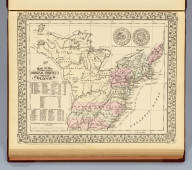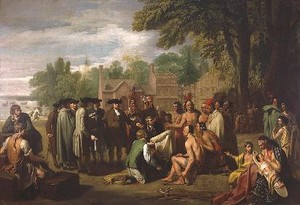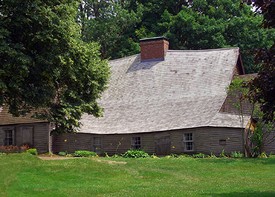Thirteen Colonies

Original map of the Thirteen Colonies
Mitchell, S. Augustus (Samuel Augustus), 1792-1868, creator Augustus), 1792-1868, creator
http://nrs.harvard.edu/urn-3:hul.ebookbatch.RUMSE_batch:ocm69650477
Early Americas Digital Archives
"a collection of electronic texts originally written in or about the Americas from 1492 to approximately 1820."
http://mith.umd.edu//eada/
American Colonies [chart]
Based on several sources, including The American Journey by Goldfield

Penn's Treaty with the Indians
Penn's Treaty with the Indians by Benjamin West (Pennsylvania Academy of the Fine Arts)
The Founding of the American Colonies
The original thirteen colonies were founded between the years 1607 and 1733. The original colonies make up what is now most of the east coast of the United States. This site provides a brief history of each of the colonies with links to additional information on each colony. Learn what countries originally controlled each colony. The colonies are divided into three different regions. Learn why each region was founded and the groups of people that settled into each of the regions.
Topic: The Thirteen Colonies Language: English Lexile: 980 http://www.qrcodesinmarketing.net
The Thirteen Colonies:the Beginning of a New Nation
Find out a wealth of information about the thirteen colonies from this site. Learn about what parts of the world the colonists came from. The thirteen colonies were divided into three regions. Find out the industries, agriculture and exports of each region. This site also lists the names of the colonies along with the dates they were formed. There is also a map of the colonies. And check out an image of the first flag of the colonies.
Topic: The Thirteen Colonies Language: English http://www.revivethespirit.com
Religion in the Original 13 Colonies
The idea of the separation of church and state in America was and still is hotly debated. Explore the history of state-supported religion in the original thirteen colonies on the ProCon web site. Even though any requirements of joining a state-supported religion were nullified after the passing of the Fourteenth Amendment in 1868, there were still many states that required membership in a state-supported religion for certain benefits during the eighteenth century. You will find a graph and excerpts from colonial era documents on this web page as well as links to related information. Topic: United States--Church history--18th century, United States--Church history--19th century Language: English Lexile: 1660 Primary Source Material http://undergod.procon.org
Tobacco: The Early History of a New World Crop
Tobacco use has been controversial for a long time. Yet, in seventeenth century Virginia, it became an economic staple and made Virginia the wealthiest of the original thirteen colonies. The National Parks Service provides a fascinating history of tobacco on its web site. Find out how Christopher Columbus learned about tobacco and how many Europeans used it both medicinally and recreationally. This article includes quotations about tobacco use from various sources. Some praise it as a wonderful source of health and wisdom; others condemn it as dangerous and foolish.
Topic: Tobacco--History Language: English Lexile: 1230 http://www.nps.gov
The 13 Colonies
A shortage of food resulted in 16th century England because farmers could make more money from wool than crops. Although the American colonies provided religious freedom and a place for people to go and farm, they were business ventures intended to make money. King James I gave half of the Atlantic seaboard to the London /Virginia Company and half to the Plymouth Company. The London Company settlers established Jamestown and learned to grow tobacco. Maryland, known for its religious freedom, used indentured servants and slaves to work tobacco plantations. Learn about the Massachusetts, New York, Pennsylvania, and the Carolinas.
Topic: The Thirteen Colonies Language: English Lexile: 1130 Video: http://www.history.com
The Fairbanks House (Dedham, MA)

The Fairbanks House in Dedham, MA is thought to be the oldest standing timber frame building in North America. Built circa 1637-1641 for Jonathan and Grace Fairebanke and their six children, it was home to eight generations of the Fairbanks family. The Fairbanks House is now a historic house museum, open annually May 1 -- October 31.
"What sort of a life did Jonathan, Grace and their six children have when they settled in Dedham? They were too busy with day-to-day living to keep detailed diaries of their activities, but there are things that we can deduce from the evidence that remains."
A Walk Through Newark
New Haven Puritans were displeased with the liberal thinking of the Connecticut colony and fled to an area along the Passaic River. This land was eventually purchased from the Hackensack Indians in exchange for goods. This website will walk you through the history of Newark and its deep religious roots. Photographs of historical landmarks add to the background information presented. This site provides information on the colonial founding, Industrial Revolution, riots, and 2002 and beyond.
Topic: New Jersey--History Language: English Lexile: BR http://www.thirteen.org
Dutch New York
The year 2009 marked the 400th anniversary of explorer Henry Hudson's voyage to New York State. Explore Dutch New York with the great videos and interactive features at this web site. Learn about the Dutch influence on New York and on the American colonies. You will find a timeline of Dutch American history and an interactive map of Manhattan in 1609. See the legacy of Dutch settlement in modern day New York City and learn about Peter Stuyvesant and his role in shaping New Amsterdam.
Topic: New York (State)--History Language: English Lexile: 1000 Interactive Video http://www.thirteen.org
The Roanoke Colonies
Sir Walter Raleigh wanted to establish the Roanoke colonies as a base for raiding Spanish ships, mining gold, and finding a passage to the Pacific. The first venture started off well, but beheading the local chief clashed with their stated intention of converting the natives and led to the English leaving. The second expedition was supposed to go to the Chesapeake, but went to Roanoke instead. A supply ship ran aground, leaving the colonists with less than a month of provisions. Disease, famine, and hurricanes struck the island. The settlement was abandoned when White returned from England.
Topic: Roanoke Colony Language: English Lexile: 1330 Encyclopedia http://www.encyclopediavirginia.org
- EResources
- Ebooks
- Contests and Opportunities
- Faculty Resources
- Library Good Reads
- GradPoint (opens in new window)
- LibGuides
- NHS Library Seminars (opens in new window)
-
Historical Links
- Immigrant Groups in the West
- Immigrant Groups in the West Making the Connections
- Immigration Symbols
- Immigration West
- Industrial Revolution Resources List
- Industrialists
- Korean War
- Legacy of Jim Crow
- The 60's
- Women and the Industrial Revolution
- Working Women and the Industrial Revolution
- Working Women During the Industrial Revolution
- Against Slavery
- Immigration
- Louis Braille An Exceptional Man
- MLA and APA Style Guides
- Norwood High School Home
- Quick reference
- Research & Instruction
- Summer Work
- Textbooks
This site provides information using PDF, visit this link to download the Adobe Acrobat Reader DC software.
